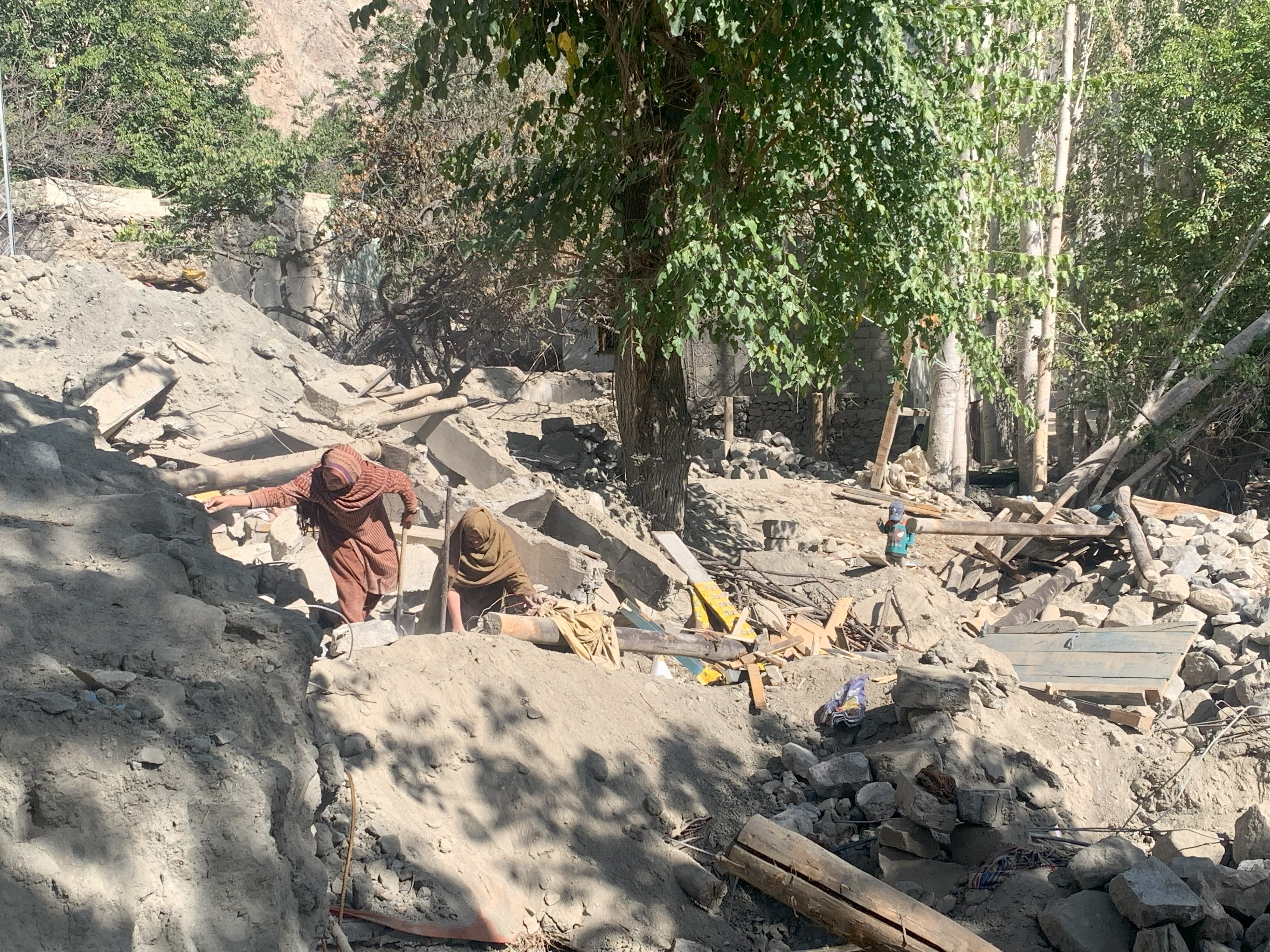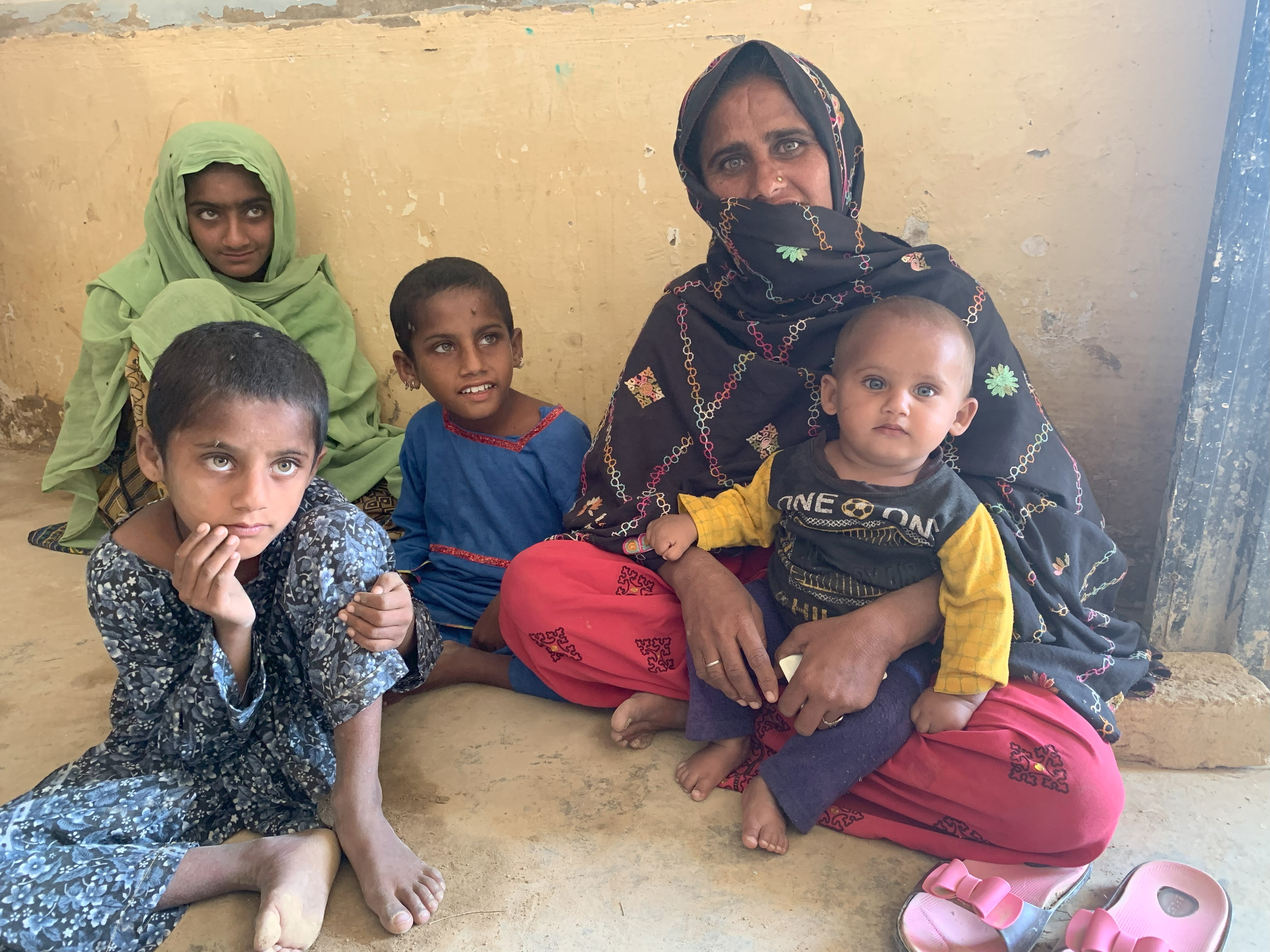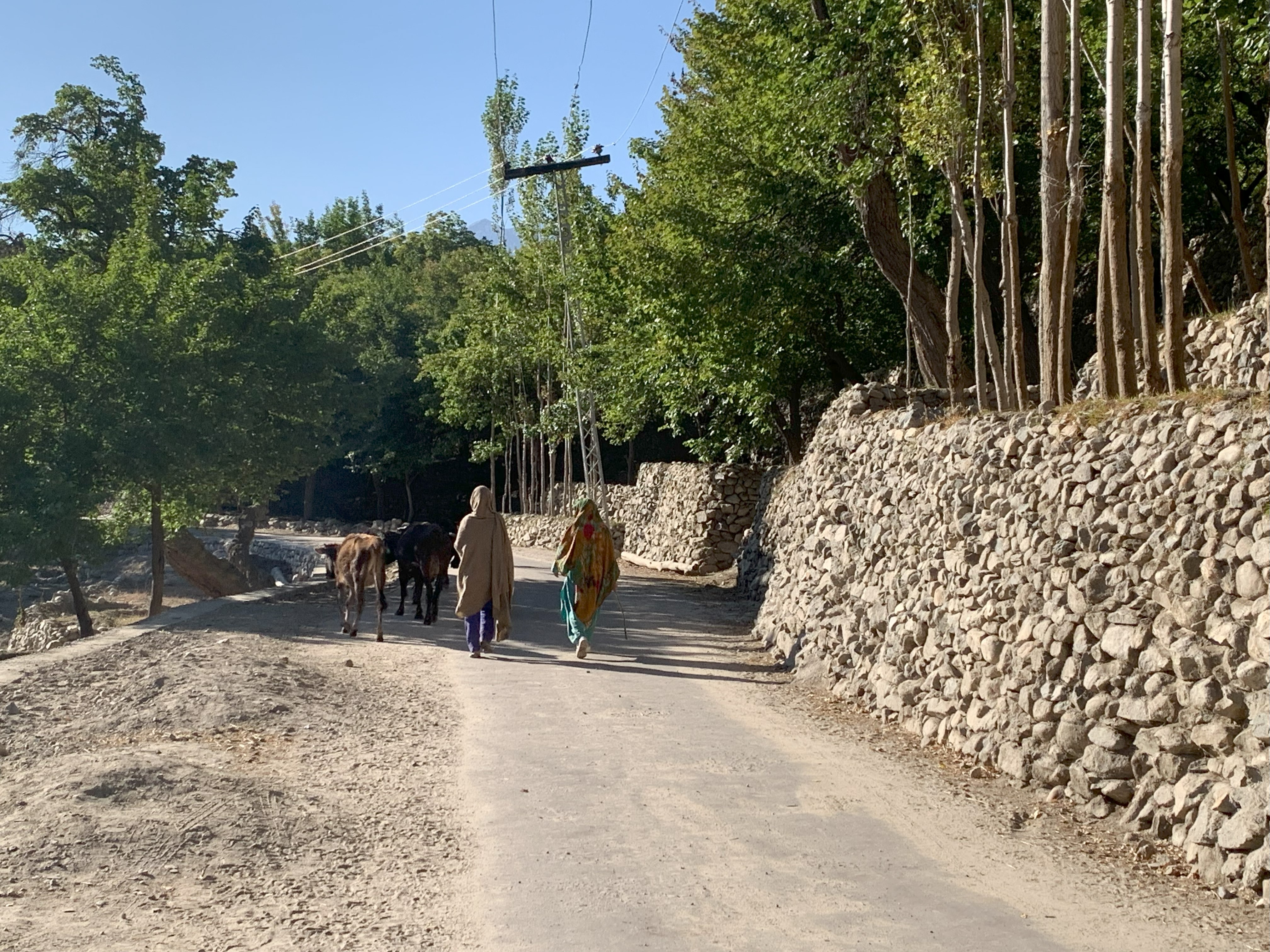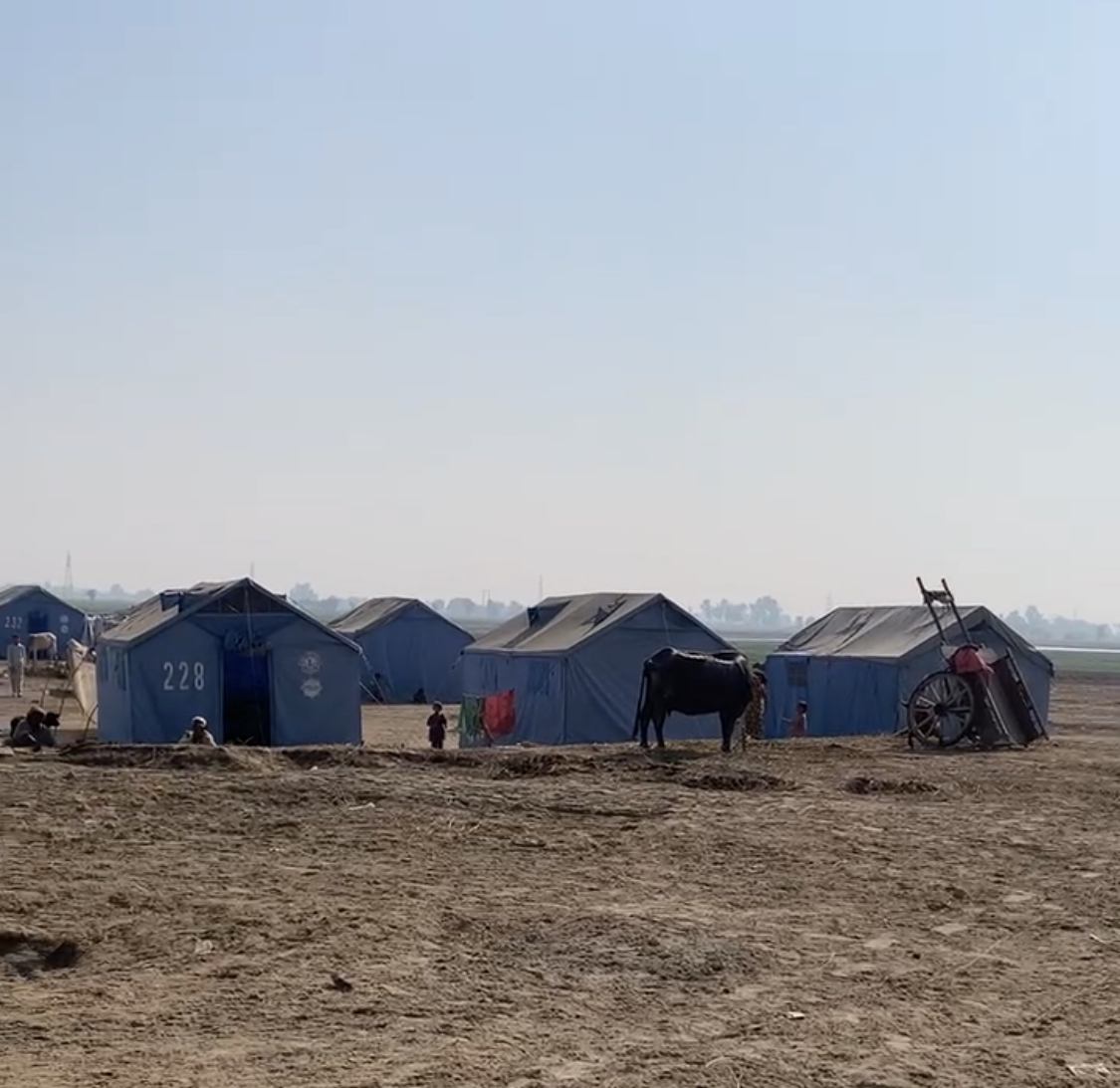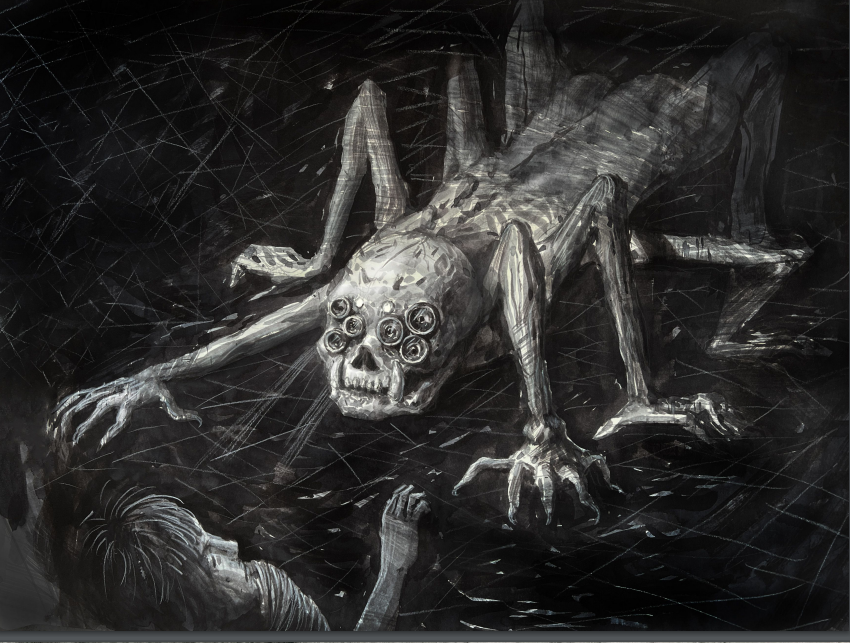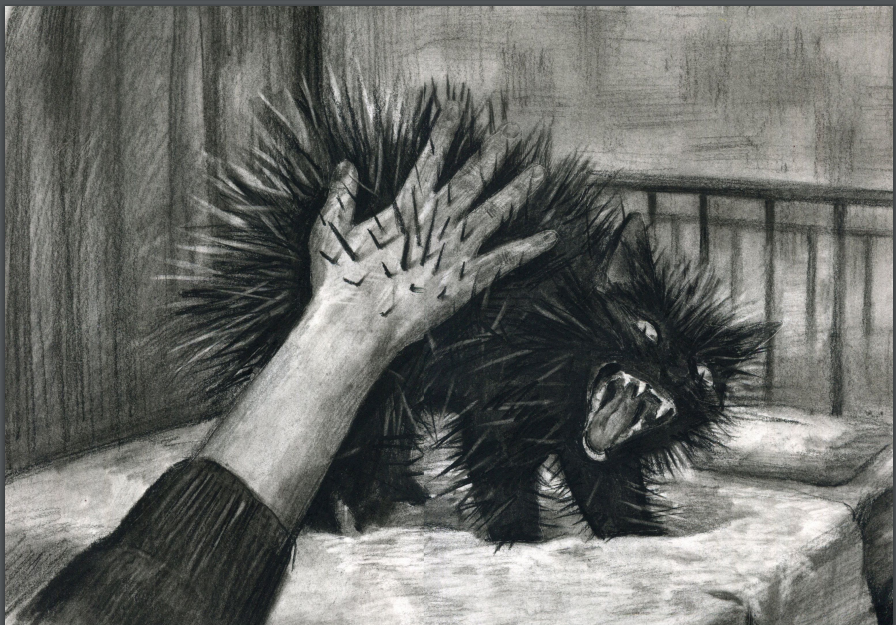Migrations Creative Writing and Art Competition 2023 Winners
View the winning submissions of the 2023 Migrations Creative Writing and Art Competition.
À la République
Victoria Abunaw '24, Earth and Atmospheric Sciences
This piece was inspired by the sculpture Le Marron Inconnu, "the unknown Maroon." This sculpture once stood in front of the presidential residence in Haiti before the earthquake of 2010. It depicts a formerly enslaved man with shackles bound to his ankles, his limbs flexible and stretched out as he blows into a conch skyward. It is widely considered the preeminent symbol of the Haiti Revolution and post-independence resistance efforts against colonial powers.
As for À la République, it was envisioned as a response to its predecessor. Indeed, the struggle of our ancestors against a colonial past and continued poverty has not yet ceased; rather, it has taken a new form, sprung from the tribulations of the contemporaneous generation. The man gazes outward, but not at the viewer, with the conch just at his lips.
The colors used for the background are a subtle allusion to the flag of Haiti, which is red on the bottom and blue at the top. In the sky is a special constellation which represents liberation from enslavement and the shared heritage of the African diaspora, especially those which arose during the trans-Atlantic slave trade; but the sky (depicted as outer space) also represents progress—a state which extends above and beyond the limits of earthly existence—the fruit of our progeny. It is futurity—the continued survival of Haiti and her people.
From Darkness to Destiny: A Migrant's "Mangaranto" of Identity, Education, and Cultural Resilience
Trifosa Simamora, Graduate student in Natural Resources and the Environment
The recollections of my past are etched in the vivid moments when my parents, amidst a power outage, in a city shrouded in darkness with closed shops, urged me to pursue my studies. The feeble glow of a lamp, fueled by a small wick and kerosene, became my guiding light during those blackout hours when I diligently tackled the homework I had been assigned that day at elementary school. The proximity to the flickering lamp left my nose tinged black from inhaling its darkened smoke. Although the day had long worn into night, my father persisted in his late-night labor, while my mother prepared fried snacks for the next day's sale. Their toil aimed at shaping the destiny of their offspring through education.
Hailing from the rich traditions of the Batak, one of the ethnic groups in Sumatra Island in Indonesia—with our own language and alphabet—my parents had long embraced the ethos of "Mangaranto”[sailing from place to place], a quest for a better life, leading them towards the flourishing island of Java, where progress and education were booming. Despite the move for enhanced opportunities, they steadfastly clung to their identity, always identifying themselves as proud members of the Batak tribe. They instilled the values and cultural essence of Batak within the family. I often pondered why education held such a profound place in their hearts, why we had to hit the books every night while our peers indulged in the latest TV shows, music, and news. Their response, "Metmetpesihapor dijungjung do siman jujungna, metmet pejolma dijungjung do baringinna"[like a tiny grasshopper lifts its head high, so should humans], a value that teaches us that despite limitations, one can uphold dignity through benevolence and responsibility. Unbeknown to me then, my mother's own unfulfilled pursuit of higher education fueled her determination to ensure that my two siblings and I would achieve a better life through college.
As an adherent of a minority religion, I encountered taunts and mockery from peers, with my faith becoming the target of ridicule. Disheartened by the unfairness, I once faced a rowdy friend's harsh tirade. In silence, I absorbed the insults, recalling my parents' teachings of "Pantun hangoluan, tois hamagoan" [politeness brings life, arrogance brings disaster], underscoring the vitality of a genial attitude and the perils of hubris. This unfair treatment fueled my resolve to fight through achievements. I toiled industriously, securing admission to high school, consistently acing my studies, and proudly earning the title of class champion. All are driven by the conviction that hard work yields success. Supportive friends and teachers surrounded me, propelling my journey as the eldest child, commencing my personal Mangaranto by seeking education in a larger city.
Finishing high school years, I was accepted into a state university in Indonesia. I vividly recall my father escorting me to the university gate, where the welcoming words proclaimed, "Welcome, the best sons and daughters of the nation."A proud smile adorned my father's face as he wished me, "Good luck, the best daughter of the nation." Those words ignited a surge of pride within me, marking the commencement of over a decade away from my parents, navigating a migratory existence. I realized that in larger and modern cities, respect for others was paramount. My experiences from childhood, which were concealed in smaller towns, found expression through academic excellence and unwavering integrity on the campus —a reflection of the Batak values "Hasangapon"[dignity and honor] embodying nobility and dignity, and mitigating the "fear of difference."
Securing a scholarship for studies abroad posed formidable challenges, even facing opposition from my parents at one point. Acceptance into a master's program in the U.S.triggered trepidation as I commenced my education in 2021 amid the rampant COVID-19 pandemic and physical distancing. The events surrounding the murder of George Floyd further heightened concerns about the educational landscape in the U.S. Despite the initial fears, life in the U.S. unfolded as an opportunity to explore diverse cultures, forge friendships with individuals from various countries, and delve into the uniqueness of global societies. The marginalization I experienced in my youth fostered empathy for friends facing similar challenges. Upholding the Batak value of "Marsisarian"[mutual understanding and assistance in conflict situations], I found solace in the efforts of individuals and institutions to foster diversity, equity, inclusion, and belonging in U.S. higher education. The marginalized perspective instilled a profound appreciation for the depth beyond superficial labels, appearances, and accessories—an understanding that every human deserves respect and honor.
Upon completing my master's degree, I returned to Indonesia, where my parents beamed with delight. Yet, I recognize that my Mangaranto journey remains. Acceptance into Cornell evoked profound emotions of gratitude, a reality surpassing my wildest dreams. Excitement overwhelms me as I acknowledge the continued opportunity for further education. Practicing the Batak value of "Hamajuon"[progress to enhance competence], I realized that my migratory journey is the mixture of personal aspirations along with the pervasive influence of my family's strong Batak culture. The journey has intertwined my personality with a myriad of values, and every new destination offers lessons in shaping my evolving identity. An Indonesian proverb, "Dimana bumi dipijak, disitu langit dijunjung"[wherever on earth you tread, the same sky is being upheld] underscores the importance ofrespecting local customs, a belief that the virtues we carry from our culture contribute positively to the communities we encounter, enriching our shared society
In essence, my journey encapsulates not only personal growth but also the collective progression of embracing diversity, fostering inclusion, and upholding mutual respect across borders. Each chapter adds a layer to the narrative, emphasizing the interconnec edness of cultures and the richness derived from understanding and honoring one another. As I navigate my path, the values instilled by my parents and the Batak traditions continue to guide me, urging me to contribute to a world where differences are celebrated, and unity prevails.
Returning to Nothing: Migration and Displacement from the 2022 Floods in Pakistan
Tabindah Anwar, Graduate student in Global Development
Anwar took all the photographs included in this essay during their fieldwork in some of the worst flood-impacted districts in Pakistan in 2022.
Women searching for documents and essential items after the flash flood destroyed their houses. Location: Gilgit-Baltistan, Pakistan
Climate disasters weaken social structures and exacerbate existing inequalities. In 2022, Pakistan was hit by one of the worst floods in decades, where more than 33 million people were impacted. And nearly 8 million people, a population almost the size of New York City, were internally displaced.
These nationwide floods occurred as a result of unusually extreme monsoon rainfalls.“Screams of people woke me up,” said Yasmeen, a 28-year-old woman who lived in a valley in the northern mountains of Pakistan. The torrential rain and forceful gushes of water down the mountain ridges destroyed everything on its way, including houses and farmlands, and killed thousands of livestock. With only the clothes left on their bodies, Yasmeen and her family rushed to find shelter in the nearest village.
In rural areas, livestock and agricultural produce are sources of food and income for people. Even if their houses are reconstructed, it would take several years for Yasmeen’s family, and many others like them, to recover from the loss of livestock and crop damage.
Meanwhile, thousands of miles southwards in Balochistan, Laila, a young mother of four children, explains the terror she felt when carrying her children to a safe location during the flood. "One of my children has a hearing impairment, and she froze with confusion," said Laila. Laila’s husband farmed on leased land, and their source of income was from selling the harvest. Their wheat crop was destroyed, and with the standing water in the field, there were no prospects of sowing for the next season. Already poverty-stricken, Laila’s husband had no choice but to migrate to the nearby urban center to find work and a daily wage. Laila was left behind, taking care of her children alone, as she took temporary shelter in a relative’s home.
Displacement due to climate disasters and migration to revive the livelihoods weaken a family unit and the social structure. The families are forced by their conditions to split up, where the male members of the family, including the father and the elder son, move to an urban center for a daily wage. Women are responsible for agriculture, caring for the livestock, and raising their children alone. There is immense pressure on them, and the responsibilities are many. With that, they cannot send their children to school, especially the female child, who is usually helping the mother out.
Women provide most of the labor in taking care of livestock. Location: Gilgit-Baltistan, Pakistan
Political displacement and climate displacement can have compounding effects on people’s resilience to cope with disasters. Pakistan’s former Federally Administered Tribal Areas (FATA), a region that also borders Afghanistan, has Afghan refugees and internally displaced communities from the aftermath of decades of militancy and terrorism in these areas. In recent history, these areas were merged with the Khyber Pakhtunkhwa Province of Pakistan for better economic integration ofthe local communities. With existing precarious economic conditions, when the floods hit this area in 2022, many Afghan families who had fled the Taliban takeover in August 2021 were displaced again. Many did not have legal documentation or refugee cards, so they had trouble accessing social services in their host country.
Mehr, a village in the southernmost part of the country, was one of the many submerged areas during the floods. Sumaya, a local woman, shares the agony of escaping on a boat while being heavily pregnant. With most of their belongings destroyed, and their animals killed, families took their remaining livestock with them on fishermen's boats to the nearest dry area. If lucky, families would find camps, but most live in the open air without shelter from the cold or the mosquitos. Women had no privacy, they had to defecate openly, and a few even gave birth while living on the campsites. People lived in these conditions for more than two months, and as the water receded, they returned to their villages to rebuild their homes. These families have fallen into the vicious cycle of poverty, and relying on the government’s meager social support is their only hope to make ends meet.
The increased uncertainty due to migration and displacement means losing resilience and agency, which leads to increasing reliance and dependence on social services and humanitarian aid. However, not everyone impacted by a disaster can access social services equally.A woman-headed household living on a campsite will face more constraints in reviving their lost identity documentation and accessing social support. This exacerbates and reinforces inequalities.
People at the frontline of the impacts of climate change are often already vulnerable and poor and rely on subsistence farming and animal herding as a source of income and food. These communities have not contributed towards climate change, yet they face a heavy brunt. This is a form of environmental injustice. The perspectives of the climate-vulnerable communities should be voiced in our academic and policy work so we can meaningfully advocate for those communities struggling to build resilience after being displaced.
What Freedom Was
Rachel Friedland '25, Human Biology, Health, and Society
Freedom was the shoebox apartment on Orchard Street
With white voile curtains and mismatched chairs
Hot concrete on the balls of his feet in the summer
Weaving through pant legs looking for his mother
Peddlers and pushcarts and mangoes and pears
Freedom was three cots on the kitchen floor
Splintering planks that complained and groaned
One couch and one bed shared by nine
A window mooring the end of a clothesline
Tethering families adrift from home
Freedom was the first two candles on the windowsill
Lighting a life that was forced into shade
A fist of sweet bread and small cup of wine
His belly of hope that here we’d be fine
To pray and to laugh and to sing unafraid
But freedom was not.
Six nieces and four cousins killed naked
Two brothers lost in the fight overseas
The newsstand he opened on Delancey
A hotbox of headlines
He carried a gun
Freedom was his great granddaughter studying biology
In a university library eyes glued to a screen
Biting her tongue while she unraveled thread
Students in her classes wanting her dead
No, freedom was not what he thought it would mean.
We Live We Judge We Lie
Inae Kim '27, Landscape Architecture
"let me check my phone to know you"
We always pull up our phones to know about each other, for example, trading phone numbers, social media, or text. I felt like people these days judge and look at others through their phones. The monster in the drawing has iPhone camera eyes instead of regular eyes.
"Don't come to me"
People hurt each other even when they do not mean to. The hand in the drawing is trying to pet the cat, but the cat is offending the hand. This shows the unparalleled intentions of approach to each other


